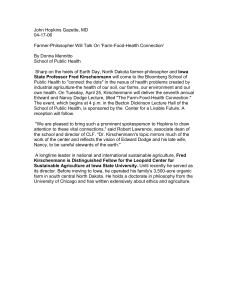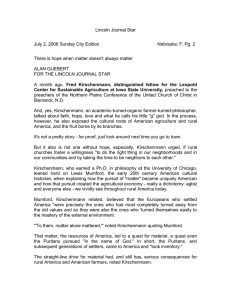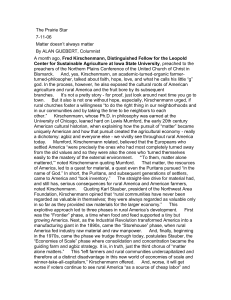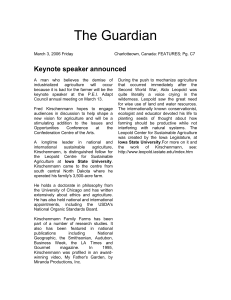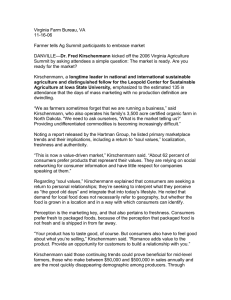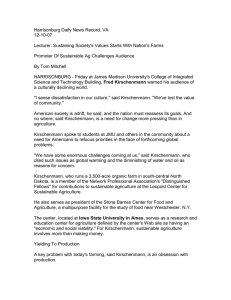Lincoln Journal Star, NE 07-03-06
advertisement
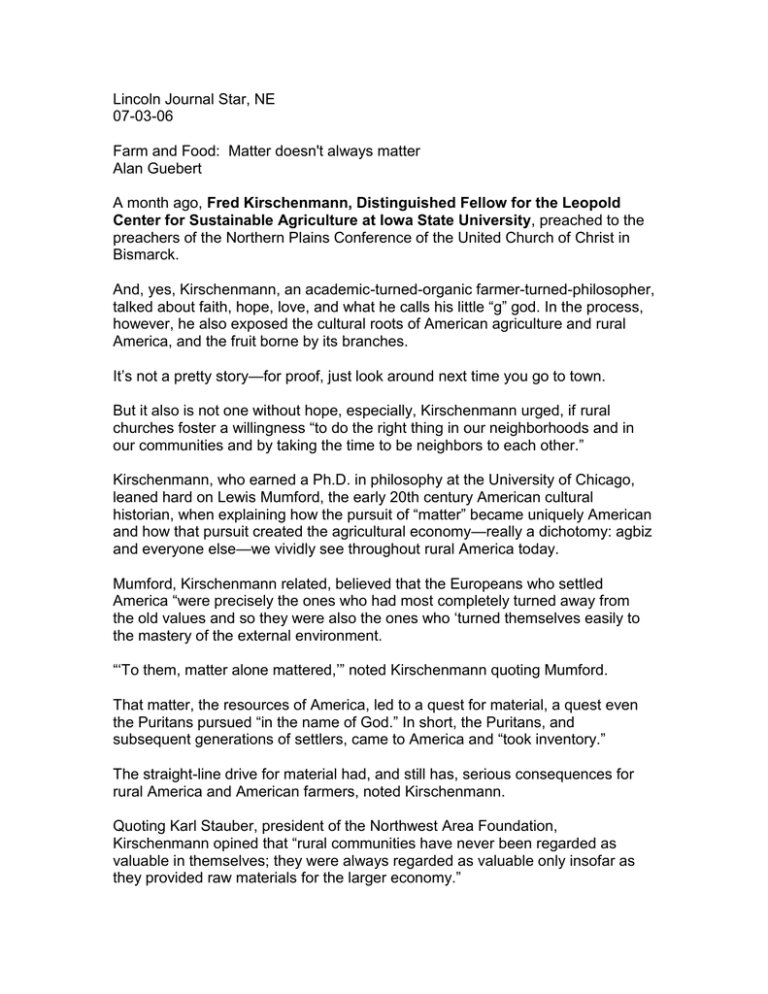
Lincoln Journal Star, NE 07-03-06 Farm and Food: Matter doesn't always matter Alan Guebert A month ago, Fred Kirschenmann, Distinguished Fellow for the Leopold Center for Sustainable Agriculture at Iowa State University, preached to the preachers of the Northern Plains Conference of the United Church of Christ in Bismarck. And, yes, Kirschenmann, an academic-turned-organic farmer-turned-philosopher, talked about faith, hope, love, and what he calls his little “g” god. In the process, however, he also exposed the cultural roots of American agriculture and rural America, and the fruit borne by its branches. It’s not a pretty story—for proof, just look around next time you go to town. But it also is not one without hope, especially, Kirschenmann urged, if rural churches foster a willingness “to do the right thing in our neighborhoods and in our communities and by taking the time to be neighbors to each other.” Kirschenmann, who earned a Ph.D. in philosophy at the University of Chicago, leaned hard on Lewis Mumford, the early 20th century American cultural historian, when explaining how the pursuit of “matter” became uniquely American and how that pursuit created the agricultural economy—really a dichotomy: agbiz and everyone else—we vividly see throughout rural America today. Mumford, Kirschenmann related, believed that the Europeans who settled America “were precisely the ones who had most completely turned away from the old values and so they were also the ones who ‘turned themselves easily to the mastery of the external environment. “‘To them, matter alone mattered,’” noted Kirschenmann quoting Mumford. That matter, the resources of America, led to a quest for material, a quest even the Puritans pursued “in the name of God.” In short, the Puritans, and subsequent generations of settlers, came to America and “took inventory.” The straight-line drive for material had, and still has, serious consequences for rural America and American farmers, noted Kirschenmann. Quoting Karl Stauber, president of the Northwest Area Foundation, Kirschenmann opined that “rural communities have never been regarded as valuable in themselves; they were always regarded as valuable only insofar as they provided raw materials for the larger economy.” This exploitive approach led to three phases in rural America’s development. First was the “Frontier” phase, a time when food and feed supported a tiny but growing America. Next, as the Industrial Revolution transformed America into a manufacturing giant in the 1890s, came the “Storehouse” phase, when rural America fed to industry raw material and raw manpower. And, finally, beginning in the 1970s, came the phase we trudge through today, postulates Stauber, the “Economies of Scale” phase where consolidation and concentration became the guiding farm and agbiz strategy. It is, in truth, just the third chorus of “matter alone matters.” “This left farmers and rural communities undercapitalized and therefore at a distinct disadvantage in this new world of economies of scale and winner-takeall-capitalism,” Kirschenmann offered. And, worse, it will get worse if voters continue to see rural America “as a source of cheap labor” and “not competitive (but) failed communities.” But there is hope, Kirschenmann insisted, if we address the “cultural and spiritual vacuum that has plagued our rural communities from the beginning.” Start by using the word “hope,” he said, in its proper Biblical context. Hope, “is not based on what we see out there in the world, but what we value inside ourselves. ... (It) is not confidence that things will turn out all right, but a commitment to justice when there appears to be little to be gained by that commitment.” The churches have always taught this—from the prophet Isaiah to Rev. Martin Luther King—and it’s time to teach it again, believes Kirschenmann. “Who better than the faith community to call attention to the fact that matter is not the only thing that matters, that cooperation and equity may do more to produce a healthy economy in the long run than competition and violence...” And it can’t be done through politics, he stresses. “What our faith suggests is that in god’s kingdom a ‘voice crying in the wilderness’ is preferable to a cozy relationship on K Street.” In short, matter doesn’t always matter. Faith and hope, however, do. Alan Guebert is a freelance agricultural journalist. He can be reached at agcomm@sbcglobal.net or at 21673 Lago Dr., Delavan, IL 61734.
